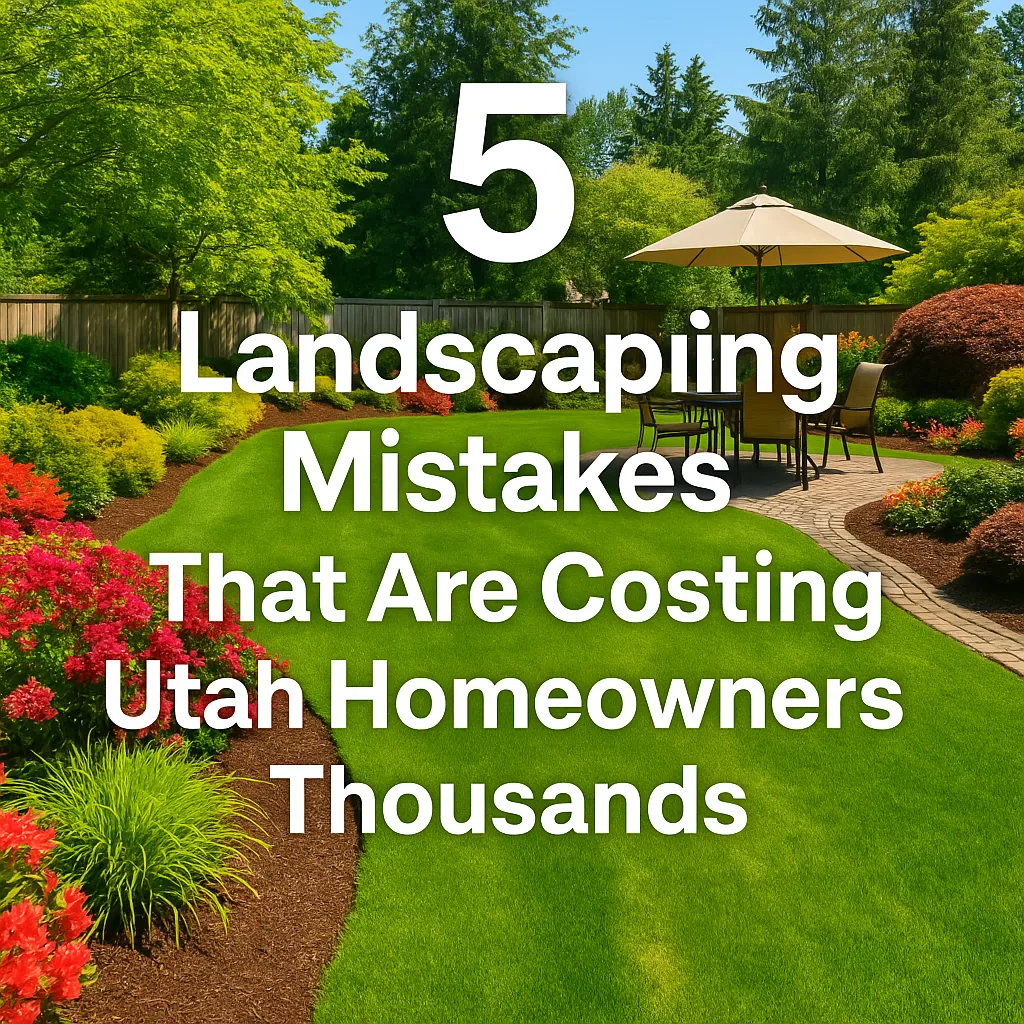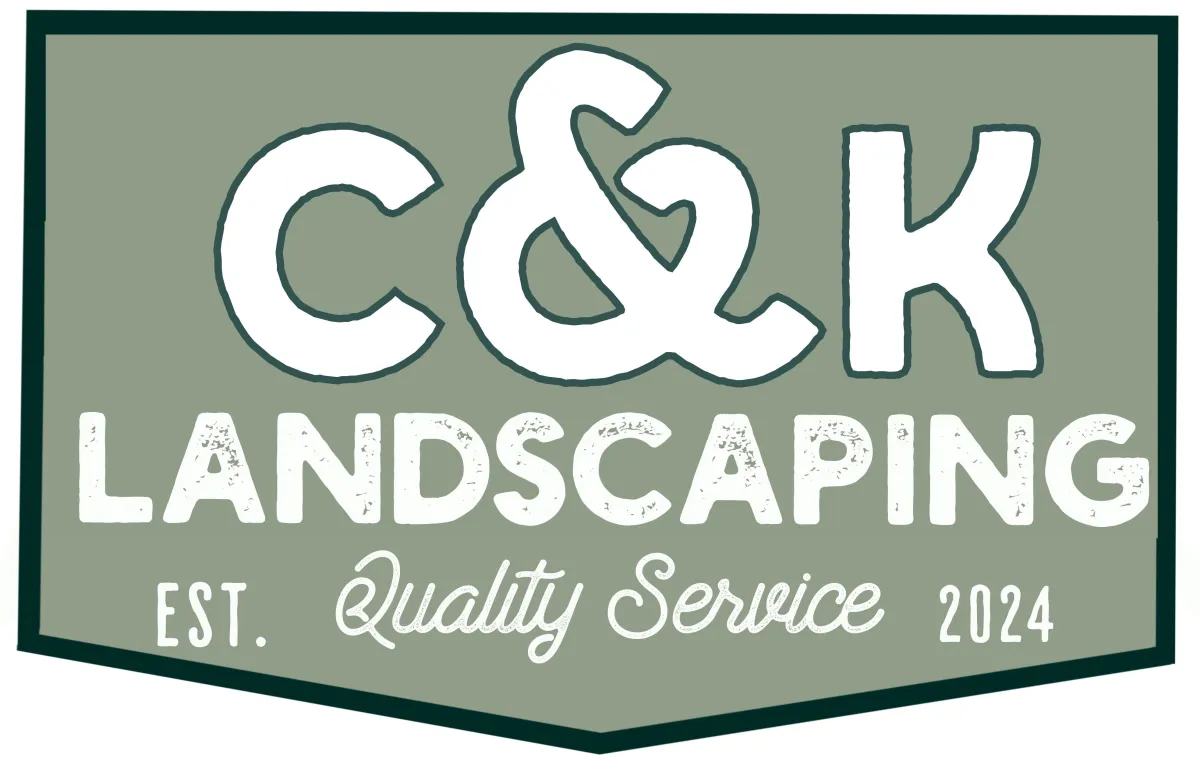Groundwork with C&K
Laying the foundation for better landscapes—expert advice, local insights, and outdoor inspiration.
Expert Tips for Thriving Utah Landscapes
Welcome to Groundwork with C&K, your go-to resource for expert landscaping insights, sustainable design ideas, and smart outdoor solutions tailored for Utah living. Whether you're dreaming of a drought-tolerant garden, planning a full-yard transformation, or just want to make your landscape easier to maintain, we’re here to help you lay the foundation for a yard that’s as functional as it is beautiful.

5 Landscaping Mistakes That Are Costing Utah Homeowners Thousands
Your neighbor's yard looks like a magazine cover in May. By August, it's a $20,000 lesson in what not to do in Southern Utah's climate. Sound familiar?
Utah homeowners lose thousands annually on landscaping mistakes that seem minor but compound into major headaches. The good news? These expensive errors are completely preventable when you understand what actually works in our high-desert environment.
Let's break down the five costliest landscaping mistakes plaguing Central and Southern Utah—and how to avoid becoming another cautionary tale.
Mistake #1: Choosing Plants That Fight Utah's Climate
The Error: Falling in love with Pinterest-perfect landscapes designed for completely different climates. That lush English garden look? It's a water-guzzling disaster waiting to happen in Richfield's climate.
The Cost: Homeowners spend $3,000-8,000 annually replacing failed plantings, plus skyrocketing water bills that can double during summer months. One Manti homeowner recently calculated they'd spent $15,000 over three years replacing the same flower beds repeatedly.
The Reality: Plants that thrive in humid, temperate climates struggle against Utah's intense UV, alkaline soil, and dramatic temperature swings. That gorgeous hydrangea might survive one summer, but it's living on borrowed time.
The Smart Solution: Embrace Utah's native and adapted plants. Russian sage, penstemon, and ornamental grasses don't just survive our climate—they thrive in it. These plants establish deep root systems, handle temperature extremes, and actually look better after a few seasons of growth.
Native landscaping isn't about settling for less beauty. It's about choosing plants that deliver more color, texture, and interest while requiring minimal water and maintenance. Your wallet and your weekend schedule will thank you.

Mistake #2: Ignoring Drainage and Soil Preparation
The Error: Treating soil like dirt. Planting expensive specimens directly into Utah's heavy clay or rocky caliche without proper preparation is like building a house on quicksand.
The Cost: Poor drainage destroys root systems, leading to plant replacement costs and potential foundation damage. Inadequate soil preparation can waste 70% of your landscape investment within two years.
The Hidden Problem: Utah's clay soils become concrete-hard when dry and swampy when wet. Plants can't establish healthy root systems in these extreme conditions, leading to stunted growth, disease susceptibility, and eventual death.
The Professional Approach: Proper soil amendment and drainage installation might add 20-30% to initial costs but prevents 80% of future problems. This includes organic matter incorporation, drainage tile installation where needed, and pH adjustment for optimal plant health.
Quality soil preparation creates the foundation for everything else to succeed. Skip this step, and even the best plants and irrigation systems will underperform.

Mistake #3: Installing Irrigation Systems Wrong
The Error: Treating all irrigation zones the same. Mixing plant types with different water needs on the same irrigation zone creates either drought stress or root rot—both expensive to fix.
The Cost: Improperly zoned irrigation leads to 40-60% higher water bills and frequent plant replacements. One Monroe family discovered their "efficient" sprinkler system was actually overwatering their xerophytic plants while underwatering their lawn areas.
The Technical Reality: Different plant types require different watering schedules, durations, and methods. Grouping high-water plants with drought-tolerant species on the same irrigation zone guarantees problems.
The Smart System Design: Professional irrigation design creates hydrozones—grouping plants with similar water needs together. Drip irrigation for xerophytic plantings, separate zones for turf areas, and smart controllers that adjust for weather conditions optimize both plant health and water efficiency.
Modern irrigation technology includes soil moisture sensors, weather-responsive programming, and zone-specific scheduling. These features pay for themselves through reduced water costs and healthier landscapes.

Mistake #4: Skipping Professional Design for Major Projects
The Error: Believing that landscape design is just about making things look pretty. DIY approaches often ignore crucial factors like mature plant sizes, sun/shade patterns, and long-term maintenance requirements.
The Cost: Design mistakes compound over time. Oversized plants crowd out smaller specimens, poorly planned layouts create maintenance nightmares, and inadequate spacing leads to complete redesigns within 5-7 years.
The Consequences: That ornamental tree planted too close to the house? It's now threatening your foundation and blocking windows. Those shrubs that looked perfectly sized at planting? They're now blocking walkways and requiring constant pruning.
The Professional Advantage: Experienced designers understand plant maturity, seasonal changes, and long-term growth patterns. They plan for how your landscape will look and function in 10-15 years, not just next season.
Professional design also optimizes maintenance efficiency. Proper plant placement, appropriate species selection, and smart layout decisions minimize ongoing care requirements while maximizing visual impact.

Mistake #5: Choosing Contractors Based on Price Alone
The Error: Selecting landscape contractors solely on lowest bid without considering experience, local knowledge, or long-term warranty coverage.
The Cost: Cheap installations often require complete replacement within 3-5 years. Poor workmanship on hardscape projects can cost $10,000-25,000 to correct, especially when drainage and foundation issues develop.
The Hidden Risks: Inexperienced contractors may not understand Utah's soil conditions, proper grading techniques, or climate-appropriate plant selection. Their "savings" become your expensive problems.
The Quality Indicators: Look for contractors with established local reputations, specific experience with Utah's climate challenges, and comprehensive warranty coverage. Ask for references from projects completed 3-5 years ago to assess long-term performance.
Quality contractors invest in proper preparation, use appropriate materials, and stand behind their work. Their initial costs reflect the value of expertise that prevents future problems.
The Smart Path Forward
Avoiding these mistakes starts with understanding that landscaping in Southern Utah requires climate-specific expertise. Cookie-cutter approaches that work in other regions often fail spectacularly in our unique environment.
Successful Utah landscaping combines native plant knowledge, proper soil preparation, efficient irrigation design, and quality installation techniques. This isn't about spending more money—it's about spending money more wisely.
Work with local professionals who understand xeriscaping principles, soil conditions in your specific area, and long-term maintenance requirements. Their expertise prevents the costly mistakes that turn dream landscapes into financial nightmares.
Transform Mistakes into Success
The difference between landscaping success and expensive failure often comes down to local expertise and climate-appropriate design. Utah's unique conditions demand specialized knowledge that generic approaches simply can't provide.
Professional landscape design and installation might cost more initially, but it prevents the recurring expenses that plague poorly planned projects. When you factor in water savings, reduced maintenance costs, and elimination of plant replacement expenses, quality landscaping pays for itself.
Your landscape should enhance your property value and quality of life, not drain your bank account through endless repairs and replacements. Choose partners who understand Utah's climate challenges and have the experience to create lasting outdoor spaces.
Ready to avoid these costly mistakes? Schedule a free consultation with C&K Landscaping today. Let our Southern Utah expertise help you create beautiful, durable landscapes that work with our climate instead of fighting against it.
